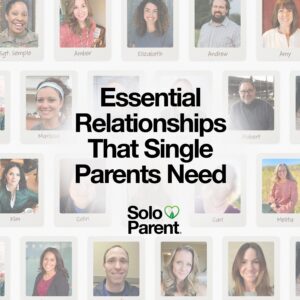Okay, so if forgiveness was an easy thing to do, our lives would be much less complicated, but forgiveness is hard. It takes work. It’s so much more than a casual “I’m sorry.” And when we do take steps towards being forgiven, how do we live in the tension of doing the work and still showing up even when someone won’t forgive us?
Today we’re going to be talking about this in three main ways. Number one, we’re going to talk about analyzing the apology. Number two, understanding the most hard-to-forgive hurts. And number three, we’re going to talk about taking stock of what you can control.
Let’s talk about analyzing the apology.
I think there’s a necessary part of seeking forgiveness and wanting restoration. That includes being really thoughtful about understanding, “Did I apologize well? Did I take full ownership of my part in what happened?” Maybe it’s also “Did I allow them space to take ownership for their part?” We don’t need to be taking on more than our share, but a huge part of asking for forgiveness or seeking it is understanding that it’s not as simple as just saying “I’m sorry.” The words are not enough. It’s actually being sorry and maybe even embodying it. It’s understanding and recognizing, “I really hurt that person” and caring about the damage you caused. In fact, Karina Schumann, a Stanford University psychologist, published a paper in the Journal of Experimental Social Psychology about apologies, and she said it’s way more effective if you do use the words “I’m sorry and I was wrong.”
There are two types of apologies. The first is if it was intentional, and we apologize to admit wrongdoing: “I’m sorry, I was wrong.” And the second type is if something unintentional happened and we didn’t intend to cause harm, yet we maybe did. We apologize to express empathy, but again, “I’m sorry” is so important. Really focus on that human element of, “I’m really sorry you were hurt by that.” And maybe you can even truthfully say, “I had no intention for that to be the result, but I’m so sorry that my actions led to you being hurt.” The validation piece of it is so important and you have to have empathy in order TO not be defensive.
Who did the apology focus on? Did you only apologize about yourself, your feelings of guilt, or your desire for forgiveness? Or was it about the hurt you caused the other person? Did you actually really hear them and listen and validate? Other research finds that the most effective apology centers around the person who is harmed. So instead of putting it back on yourself, think, “How can I focus on how that person was hurt?”
People are more likely to forgive if they’ve been given a chance to express their side of the situation. “Will you tell me more about how that hurt you? Will you tell me how it impacted you?” Seeking to understand it and really just genuinely provide that stage or that space. I will tell you I was not good about this with my kids in my single-mom busyness. I would want to restore the relationship because I knew it was the right thing to do, but inside I hadn’t taken the time to actually truly understand and value and care deeply about the impact on them. I hate saying that out loud. That just feels so ugly to me. But there were times I just wanted to get on down the road? Can we get past this bump and just keep moving? And so my apology was serving a function that was a lot about me and about where we were at in life.
I think it’s so important to understand the motivation behind an apology if it’s our intention to just get forgiveness. I don’t know if that’s a real apology. It’s kind of like, “I just want to get past this, so I want to kind of move on. I’m just doing the right thing.” Whereas if the motivation is for us to seek freedom from the infraction and admitting that we fell short, that’s a healthy motivation. A couple years after the divorce, when I’d done some of my own work, I wrote this long letter to my ex. And at one of the visitations, I gave it to her, and I made a decision that I was going to just “fall on the sword” for everything that I had done wrong. And I can honestly say that that motivation had nothing to do with even necessarily getting forgiveness. I thought there was a strong likelihood she might even just throw the letter back at me or say some choice words. But my motivation wasn’t that.
My motivation was more to clean out the cupboards, the darkness, and really sit as if I were on the receiving side of some of the ways I acted as a husband. It’s not excusing anything. And I will say that once I was able to do that and give her the letter, it actually felt like I was giving her all the crap: “I’m not going to carry this around anymore. You can get rid of it too if you want, but it’s not on me.” Understanding the motivation of an apology is super important to really determine if it was an apology or either placating or just trying to move forward?
Do you think your ability to process through toxic shame and move into a place of healthy shame is in direct correlation to forgiveness?
Yes. If we’re carrying around toxic shame, it’s so difficult to open up the vault and be vulnerable to say, “Man, I totally screwed up.” And if we need to apologize to someone who doesn’t feel safe, it can be even harder to ask for forgiveness. But that’s a key step to include in a good apology—ask for forgiveness and acknowledge that you messed up, explain why you did it, not to make excuses, but to share how you’ll fix this situation to make amends and really have an expression of remorse. But that’s incredibly difficult if we’re so wrapped up in how bad we feel about ourselves that we can’t even look at it honestly.
Chip Dodd talked about the need for forgiveness being tied to the feeling of guilt. And that’s the gift of it, is that forgiveness comes out of it. But when you don’t deal with your guilt, that’s when you go into toxic shame. When I talk about my worst moments with my kids, as a single parent, real restoration and forgiveness with them didn’t happen until I actually said the words: “I shouldn’t have pulled your hair. I shouldn’t have screamed at you. I was wrong. That was abusive.” It was very humbling, but it was accurate, and I needed to state it so plainly so they understood the depth of sorrow I had in causing harm in those moments. And I’m going to zoom back a little, just even for my own relief, to say that my kids and I have talked about that since, and instances that are abusive are not always the same as a pattern of “capital A abuse.” And so I had to recognize if this were a pattern of behavior, it would’ve been very destructive for my kids. Lashing out infrequently, but still abusively is really hard to say out loud. And I’m feeling the weight of that even now. I had to get very honest with myself and with them about it so that I could correct it.
First of all, what a gift that you gave them in doing that. But also, I think it’s really remarkable that you recognized it needed to be very specific and very clearly said, “I shouldn’t have done this. I shouldn’t have done that.” I think that’s really brilliant because so often, intentionally or unintentionally, if we don’t speak very clearly and hit the nail on the head of what we did wrong, I don’t know how much the other person can really receive the apology because you’re bouncing around all over the place and generalizing. Maybe you’re talking about the feeling of it, not the actual action of it. And so I really love that you said that because if you can point at that one thing, especially if they’ve said, “You did this and it hurt me,” there’s got to be a lot of restoration there. And thankfully there has been, but the restoration only came after I stopped the bad apologies. [They didn’t] hit the spot, like you said, Elizabeth, where it went right directly to the point of pain. It was more of a general thing, “I know I flew off the handle, but you all were stressing me out so bad and I didn’t sleep, and you just need to get out for school.”
What makes a bad apology?
The basic idea is that we are highly motivated to maintain a positive image of ourselves, an image of self integrity, morality, and adequacy. And that was very true for me. I didn’t want to have to say those very harsh direct words about my behavior and myself. So even my own image of myself got threatened when I had to admit that I had been hurtful—and to my kids, the people I love the most. And so instead of apologizing in “the good way,” I tried to justify my words and behavior. I tried to somehow deflect the blame onto their poor choices or how hard it was. I made excuses. I minimized the consequences. Maybe I just said, “I flew off the handle” instead of “I yanked your hair” and that was not helpful. Analyzing the apology can help us understand if forgiveness isn’t coming from someone else, maybe we haven’t truly owned and taken full responsibility or made the hard required efforts to make amends.
Let’s talk about understanding the most hard-to-forgive hurts.
Everett L. Worthington, Jr. at Berkeley’s “Greater Good Magazine” puts the most hard-to-forgive hurts in three categories. Number one, people who hurt us often. Number two, huge hurts. And number three, a combination of repeated huge hurts. So let’s start off with people who hurt us often. I don’t think you can get through life without having at least one person in your life who is hurting you often, right?
Absolutely. I experienced repeated hurts (and this must feel familiar to many of our single parents) from my ex—in the process of the crisis that led to our marriage falling apart, and then ongoing deception, discovering information and lies over a series of months. The repetition of it was just grueling for me. I mean, years and years and years of the same behavior, the same deflection, it was never-ending. It makes it even worse when it’s supposed to be someone who loves you or loves your kids.
If you’re a single parent through divorce and you were married and this person’s hurting you over and over with whatever it was that led to the divorce, it makes it become a huge hurt. It’s the magnitude of the harm that makes it seem impossible to forgive. This idea that the injustice gap is a cavern, maybe the Grand Canyon. And that’s how it honestly felt to me. I was like, “Well, wait a second. For 17 years I’ve been a good faithful mom and wife pouring my life into my family, and this is what I get.” Not only was it a huge betrayal, but it also was repetitive. And it’s hard to come back from a lot of that.
Let’s talk about a combination of repeated huge hurts. So the hardest of all are the big events that are repeated, like physical, sexual, or emotional abuses, repeated discriminatory acts, gaslighting, bullying. A lot of these require some sort of deeper therapy work, especially if there’s trauma. It takes a lot to get to the root of those.
This is so important to address because all of us have been guilty of some kind of infraction. And if we’re not being forgiven or an apology is given and they don’t forgive us, we have to shine the light on ourselves and go, “Okay, did I repeatedly [do this]?” And I’ll tell you I did. I repeatedly didn’t put my wife first. And so it is a little understandable why it’s hard for her to make that leap. But for me to take stock and apologize and really own it, of course, it’s going to be hard for her to take that and to just go, “Yeah, okay, I’ll forgive you.” And it’s not necessarily because of the hardness of her heart, although it could be. It’s also that I created a pattern of hurt to her. And I think we are all guilty of doing that in some way. Maybe it’s not a big trauma, maybe it’s a little kind of thing. But that is one thing that can get in the way of people being really quick to forgive us even though we’ve apologized.
If you’re allowing the person the voice, the time, the space to be able to say, “Here are the ways that you hurt me,” believe them. Because I think our defensiveness doesn’t help them feel believed, and we’re blocking ourselves from being able to see some of these true ways that I have hurt this person. Even if you never say “Oh, whatever. I don’t believe it” out loud. Even if I can’t think of ways that might have been true, it was still true for them. And so how can I ensure I change the behavior for the future and make sure that I’m not actually the person they’re accusing me of being? That’s what I can do to help the situation. And having the humility of being willing to consider I might have a blind spot.
Let’s talk about taking stock of the things that we can control.
The first thing we should consider is how we apologized. What did it look like? Second, did we truly exhibit remorse? And that word “exhibit” is important because it’s not just expressing with words, but demonstrating that we have taken responsibility, offered to make amends, and followed through in helping the person that we’ve harmed or hurt to reassure them that we are putting some traction to what we said. You’re making changes and aren’t planning to repeat the behavior that hurt them. And so that’s an important step. And then finally, reaching out to the person to say, “Hey, do you think we could try this again?” Maybe it’s a confrontation, which isn’t necessarily conflictual, but the idea of confronting their unforgiveness and saying, H”ey, I know you haven’t been ready to forgive me yet. I’d really like to talk more about that so I can understand more.” That may or may not be possible in every situation, but that’s something you could consider doing that’s within your agency. It’s saying, “You know what? I do want to lean back in and I want to take the risk of having to confront that pain again and confront the breach between us.” The relationship means enough that I’m going to approach it and maybe ask, “Could we talk about this further? I want to understand more.” Or “You mean so much to me and I want you to know I’m hurting because our relationship is disconnected.” But you need to be really mindful of looking at those first pieces too.
There may be an opportunity to confront them on the fact they aren’t forgiving you, and finding out why. Maybe even ask, “I would love to know your thoughts on this.” And that’s okay if they’re unwilling to forgive, but understanding why they’re unwilling to forgive. Am I continuing to show up in ways that I’m not trustworthy of your forgiveness?
What if you’re making that attempt and someone just says to you, “I don’t want to rehash this again, you’re just going to turn it all around on me and it’s going to be all my fault”?
They’re going, “No, I don’t want to go there.”
I think it’s a willingness to accept where they are, to have some respect for it, to feel the sorrow that they don’t want to engage with you. Apparently your behavior has led to such a breach of trust that they are unwilling to enter into a conversation like that with you to lower their guard or be vulnerable in that way. And maybe it’s an opportunity for a lot of self-reflection: “It looks like I may have caused a situation that I am not trustworthy, they don’t feel safe with me.” I think it’s so important to have community that can reflect to you what’s true and where you can have a trusted source to say, “Man, where did I go wrong here? Or am I reading this right?” It may be that the other person has some work to do, particularly if they are very easily alienated or very hypervigilant about a situation, so they don’t want to lean in again. We can offer ourselves forgiveness, an opportunity to reflect and say, “You know what? I am deeply sorry about these things I did, and that other stuff isn’t on me.” So I think it can be an invitation for us to think about cleaning up our side of the street.
The only thing you can do is really practice forgiving yourself and recognize that the act of asking for forgiveness or apology is not to have them let you off the hook. It’s taking ownership. And so you can start letting yourself off the hook by releasing this and starting to forgive yourself. That doesn’t require the other person, necessarily. I think optimally that would be a beautiful thing. But I did try to make amends, and I’ve had to forgive myself, and that is something that I can control and it does work.
The codependency piece of this still rings true for me. IWhat I hear you saying is that even in self-forgiveness, you’ve let go of the control of what the other person’s decision is—to forgive you or not forgive you. And I think that’s a huge piece of it; we don’t have control over whether or not they’re going to forgive us. But also taking into account and understanding that they might feel what you did is inexcusable, unforgivable. And their feelings are valid because you can’t have control over someone else’s boundaries on what they see as right, or what justice looks like to them or what they experience. And so you have to almost release that and say they get to be their own person. They get to have the feelings that they have. They get to have experienced this the way they’ve experienced it, and we may not have the ability to know what their inner worlds look like. And so sitting in the discomfort of that and releasing control of it.
Takeaways
- We need to realize that sometimes our apologies aren’t actually apologies, and we need to be cognizant of that. We need to really analyze our apology.
- There’s often a reason some hurts are easier to forgive than others and some that are just really difficult to get past, whether it’s the way they experienced it or the infraction of it. Some things are harder to get past, especially repetitive hard things.
- We only have control over our own actions and we can only be one half of repairing a relationship. If we’ve analyzed it and recognized our wrongdoing and put it out there and offered to go there, that’s all we can do. At that point, we have to surrender and realize all we can do is control our own actions.
What is your favorite fiction book or series?
I loved the “Chronicles of Narnia” series, and I was read “The Lion, the Witch, and the Wardrobe” as a child from a sibling. And I read that first one to my children. And I love the “Little House on the Prairie Series,” “Anne of Green Gables,” so there are some really sweet fictional series that might appeal to some of our audience’s children.
One of my favorite authors right now is Greg Hurwitz, and he has this series called “The Orphan Series.” The not-so-good people at the CIA or FBI go and find people without fathers and mothers, and they recruit them and train them to be operatives where no one else would go. And so Orphan X is the character I follow. He’s one that’s broken out of that system, and now he just tries to do good things. I also like David Baldacci and Dan Brown.
I loved “The Hunger Game” series and I read those books in a matter of three or four days. And then also like the girly summer reads. Emily Giffin has a bunch of different books, but I really like her, I like her books.
Some of our audience might know the author of Francine Rivers, and I like a series of hers “Mark of the Lion.” It’s historical fiction.
We love hearing from you. If you want to send in a question, go to our website and you will find instructions on how to email, call, or leave a voice message. You can also head over to Instagram or Facebook and send us a question there as well.




